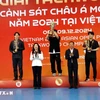Experts gathered at a national conference in the northern mountainous Lai Chau province on March 30 to discuss how to preserve and develop the culture of ethnic groups in the Thai-Kadai language family in Vietnam.
The annual conference, the 7th of its kind, included thematic discussions on the role of the Thai-Kadai language family in Vietnam’s history and culture, the Thai-Kadai community’s role in sustainable development and its integration in social life and tourism.
The event, co-hosted by the province and the Institute of Vietnamese Studies & Development Sciences under Vietnam National University-Hanoi, aimed to provide a scientific and practical foundation for addressing crucial and urgent matters in the Thai-Kadai-speaking community in Vietnam in its industrialisation, modernization, integration and sustainable development process.
Vice Chairman of the provincial People’s Committee Vuong Van Thanh said the event presented opportunities for scientists and managers in the field to gather and propose specific and relevant policies and approaches for sustainable development of the Thai-Kadai community in Vietnam.
Director of the Institute of Vietnamese Studies & Development Sciences Pham Hong Tung highlighted the achievements made by the institute’s Thai Studies Programme over the past six years in developing a network of research coordinators across the northern mountainous provinces of Son La, Dien Bien, Lai Chau, Cao Bang and Lang Son, and the central provinces of Thanh Hoa and Nghe An, where there are large Thai-Kadai communities.
Vietnam is home to 12 ethnic minorities using the Thai-Kadai language family. They are the Tay, Thai, Nung, San Chay, Giay, Lao Lu, Bo Y, La Chi, La Ha, Co Lao and Pu Peo, all play an important role in the establishment and development of the nation and its culture.
They have been a key force in ensuring political security and social order in the north and northwest border areas of the country.
The groups also boast their own unique cultural diversity, identity and natural resources, contributing significantly to the sustainable development of the region and the nation.-VNA
The annual conference, the 7th of its kind, included thematic discussions on the role of the Thai-Kadai language family in Vietnam’s history and culture, the Thai-Kadai community’s role in sustainable development and its integration in social life and tourism.
The event, co-hosted by the province and the Institute of Vietnamese Studies & Development Sciences under Vietnam National University-Hanoi, aimed to provide a scientific and practical foundation for addressing crucial and urgent matters in the Thai-Kadai-speaking community in Vietnam in its industrialisation, modernization, integration and sustainable development process.
Vice Chairman of the provincial People’s Committee Vuong Van Thanh said the event presented opportunities for scientists and managers in the field to gather and propose specific and relevant policies and approaches for sustainable development of the Thai-Kadai community in Vietnam.
Director of the Institute of Vietnamese Studies & Development Sciences Pham Hong Tung highlighted the achievements made by the institute’s Thai Studies Programme over the past six years in developing a network of research coordinators across the northern mountainous provinces of Son La, Dien Bien, Lai Chau, Cao Bang and Lang Son, and the central provinces of Thanh Hoa and Nghe An, where there are large Thai-Kadai communities.
Vietnam is home to 12 ethnic minorities using the Thai-Kadai language family. They are the Tay, Thai, Nung, San Chay, Giay, Lao Lu, Bo Y, La Chi, La Ha, Co Lao and Pu Peo, all play an important role in the establishment and development of the nation and its culture.
They have been a key force in ensuring political security and social order in the north and northwest border areas of the country.
The groups also boast their own unique cultural diversity, identity and natural resources, contributing significantly to the sustainable development of the region and the nation.-VNA



















